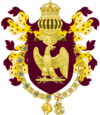Master of Offices
| Master of Offices | |
|---|---|
 Coat of Arms His Majesty's Government | |
| Imperial Office of the Emperor Palatine Office | |
| Style |
|
| Appointer | The Monarch |
| Term length | At the Emperor's pleasure |
| Formation | c. 5th century |
The Master of Offices (Latin: Magister officorum) is one of the most senior administrative officials in Latium, and the Imperial Household. The Master of Offices attends and is often responsible for presiding over Emperor's Council meetings. The office is one of the ten Vir illustris (lit. "illustrious man").
Role
The Master of Offices is often referred to as a co-head of government along with the Consul, and the Emperor himself. The Master of Offices leads and directs the Emperor's Council, serving as the chief advisor of the Monarch. He serves as the chief minister, and administrator in government and the Imperial Household.
At its inception, the Master of Offices functioned as the equivalent to a modern interior minister and state security chief. He often handled foreign affairs, intelligence collection on foreign entities, and other wide-ranging duties that included handling the Emperor's audiences and receiving ambassadors, and supervising the postal network. Today, much of the Master of Offices duties vary according to Imperial prerogative, but its core duties include management of the Imperial Household, and supervising the bureaucracy and household departments, and may oversee, but not command or order other offices in government, on the Monarch's behalf. The Master of Offices plays a key role in formal court functions. The position may be held by more than one individual, though this rarely occurs.
Since 2019, the Master of Offices serves as the nominal leader of the Scholarian Guard, though all day-to-day functions are carried out by the Legate, who is appointed by, and responsible solely to, the Monarch.
Amenities
List of Masters of Offices
Living former Masters of Offices
As of 2019 there are four living former Masters of Offices:
- Living former masters of offices
The Lord Verrucosus of Gerasa
served 1996–1998
born 1958 (age 66)The Duke of Capena
served 2000–2008
born 1940 (age 84)- Marsella Atmos.jpg
Empress Marsella, The Empress Mother
served 2008–2016
born 1966 (age 58) The Duke of Ostia
2017–2018
born 1991 (age 33)



